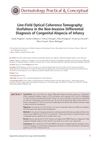Search
for
Sort by
Research
480-510 / 1000+ resultsresearch New Developments in Our Understanding of Acne Pathogenesis and Treatment
We now understand more about what causes acne and this could lead to better, more personalized treatments.

research Novel Type 1 5a-Reductase Inhibitors With Antiproliferative Potential On LNCaP Cells
New compounds may help treat prostate cancer by reducing cell growth.

research Sex Hormone-Binding Globulin as an Early Biomarker and Therapeutic Target in Polycystic Ovary Syndrome
SHBG may be a useful early indicator and treatment target for PCOS.

research Endocrine and Reproductive Effects of Polycystic Ovarian Syndrome
Losing 5-10% body weight can improve PCOS symptoms, letrozole is better than clomiphene for fertility, and managing weight and blood sugar is important to reduce pregnancy complications.

research The Hormonal Background of Hair Loss in Non-Scarring Alopecias
Hormones like androgens, estrogen, thyroid hormones, and stress hormones can contribute to hair loss, and treatments target these hormonal imbalances.

research Hair Loss And Regeneration Performed On Animal Models
Animal models are crucial for learning about hair loss and finding treatments.

research Line-Field Optical Coherence Tomography: Usefulness in the Non-Invasive Differential Diagnosis of Congenital Alopecia of Infancy
LC-OCT helps accurately diagnose different types of infant hair loss without invasive methods.

research Application of Multi-Omics Techniques to Androgenetic Alopecia: Current Status and Perspectives
Multi-omics techniques help understand the molecular causes of androgenetic alopecia.

research Comparing Current Therapeutic Modalities of Androgenic Alopecia: A Literature Review of Clinical Trials
Some treatments for hereditary hair loss are effective but vary in results and side effects; new therapies show promise but need more research.

research A Role for Steroid 5 Alpha-Reductase 1 in Vascular Remodeling During Endometrial Decidualization
The enzyme 5α-reductase type 1 is important for blood vessel development and fertility in the uterus.

research Advances in Understanding Hair Growth
Understanding glycans and enzymes that alter them is key to controlling hair growth.

research A Role for Steroid 5 Alpha-Reductase 1 in Vascular Remodeling During Endometrial Decidualization
The enzyme 5α-reductase is important for proper blood vessel development during the fertility-related transformation of the uterus lining.

research An Immune Regulatory CCT Repeat Containing Oligodeoxynucleotide Capable of Causing Hair Loss in Male Mice
A specific DNA sequence caused hair loss in male mice by activating immune cells and increasing a certain immune signal.
research Role of FGFR2-Signaling in the Pathogenesis of Acne
Increased FGFR2b signaling, influenced by androgens, plays a role in causing acne.

research Androgenetic Alopecia: A Chronic or Pubertal Onset Disease Retarded by Blood Donation
Androgenetic alopecia is a long-term, immune-related disorder that starts during puberty due to androgen secretion, and it might be improved with iron tablets, platelet transfusion, and anti-inflammation therapy.

research Benign Prostatic Hyperplasia: A Disorder of Androgen Metabolism in Males
Benign Prostatic Hyperplasia may be caused by changes in how the body processes male hormones.

research Changes in Urine Androgen and Prostaglandin Levels During Finasteride Treatment
Finasteride treatment lowers urine androgen and prostaglandin levels, making them potential markers for effectiveness.

research New Plant Extracts Exert Complementary Anti-Hair Loss Properties in Human In Vitro and Ex Vivo Models
The plant extracts may help treat hair loss by promoting hair growth and reducing DHT levels.

research Forecasting Phase 3 Dose-Response for Abrocitinib, an Oral Janus Kinase 1 Selective Inhibitor, Using Investigator’s Global Assessment and Eczema Area and Severity Index
Abrocitinib at 100 mg and 200 mg daily may significantly improve moderate-to-severe atopic dermatitis in patients 12 years and older.

research A Comparative In Vivo and In Vitro Evaluation of Hair Growth Potential of Extracts and an Isolate from Petroleum Ether Extract of Cuscuta Reflexa Roxb
Cuscuta reflexa extracts and an isolate promoted hair growth and could be natural treatments for hair loss.

research A Cross-Sectional Study of Plasma Trace Elements and Vitamins Content in Androgenetic Alopecia in Men
Men with hair loss may lack zinc, copper, and vitamin D; supplements could help.

research Neuroimmunoregulation of Androgens in the Adrenal Gland and the Skin
Cytokines and neuropeptides are key in controlling androgen levels, affecting skin and hair conditions.

research Secondary Amenorrhea: Causes, Diagnosis, and Treatment
Secondary amenorrhea has many causes and requires thorough evaluation to treat and restore menstrual cycles.

research Effects of Biomaterials Derived from Germinated Hemp Seeds on Stressed Hair Stem Cells and Immune Cells
Hemp seed biomaterials may reduce hair loss and improve hair growth.

research Serum Vitamin Levels in Different Categories of Androgenetic Alopecia Subjects
Smoking and drinking can lower vitamin levels and potentially trigger early hair loss, but overall vitamin levels don't seem to affect hair loss duration.

research A Scientific Hypothesis on the Role of Nutritional Supplements for Effective Management of Hair Loss and Promoting Hair Regrowth
Nutritional supplements can help manage hair loss and promote hair growth by strengthening hair roots and countering harmful effects of pollution, smoking, and deficiencies in vitamins and minerals.

research Effect of Cuscuta Reflexa Roxb on Androgen-Induced Alopecia
Cuscuta reflexa extract may help treat hair loss caused by hormones.
research What Does the Research Say About Androgen Use and Cerebrovascular Events?
Androgen use may increase the risk of stroke, but more research is needed.

research Management of Hair Loss in Women
Certain medications and maintaining adequate iron levels can help manage women's hair loss.